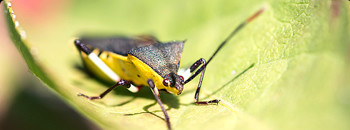Boxes are unloaded and you’ve started to unpack, but as a new homeowner, it might take some time for your new house to feel like a home. There are new sights, unfamiliar sounds and unexpected maintenance to-dos. Not to mention, summertime activities require a little extra yard upkeep, including mosquito prevention.
We’ve been in our home outside Dallas for several years, and every summer we take steps to make sure we’re doing everything we can to prevent unwanted mosquitoes bites. Although, as an entomologist, I sometimes grow a contained backyard mosquito population on purpose – all in the name of science and disease prevention. My four kids even learned how to identify different species, but I’m proactive in controlling the populations around our home and protecting my kids from mosquito bites and the diseases they can transmit, including Zika and West Nile.
The two most impactful actions you can take to protect yourself, your family and your new neighbors are eliminating standing water – a mosquito’s breeding ground – and wearing EPA-approved bug repellent. Here are a few things to keep in mind as you settle in:
- Learn about your new home’s drainage. Before breaking out the inflatable pool and outdoor furniture, learn how the water drains in certain areas of your new yard. Sometimes it takes a heavy shower to discover how and where water can accumulate. Check out the sprinkler system, and make sure caps are in place and the sprinklers aren’t leaking, which can lead to standing water. After summer rain showers, remember to also empty the standing water drained from your gutters at the downspout.
- Water your lawn and plants early in the morning. Early morning watering allows excess water to dry up throughout the day. Prevent overwatering by aiming for one inch per week, otherwise you’ll start to see an increase in multiple insects. While you’re watering, make sure your backyard is kept clean and tidy. Almost once a week, I clean up after my kids and the new dog to make sure there are no toys or hidden containers dropped anywhere in the yard with the potential to contain standing water.
- Use safe, effective products. As a mom, I only use EPA-approved mosquito repellent products, such as those containing DEET, which are scientifically proven to be safe for my kids along with women who are pregnant or nursing. These products are effective against all important mosquito species, including the Aedes aegypti which transmits Zika. What some parents may not realize is that natural does not mean safe. The only natural repellent approved by the EPA is oil of lemon eucalyptus, and it’s not approved for children younger than three years old.
- Become familiar with your community approach. If you’re moving from the city to the suburbs, there are new sights and sounds you’ll have to become accustomed to. One of these is the presence of mosquito control trucks. While you might not have seen them in the city, they were likely there. Keep in mind, the techniques and products used have all been tested for several years prior to being implemented into the community. You can check when and how often these trucks will be present through your county extension office, although most apply insecticides in the evening when mosquitoes are more active. Controlling mosquitoes is a community effort, and this is another step used to keep neighbors safe.
Common myths about mosquito prevention is citronella candles and mosquito-repelling plants will protect you from mosquito bites. Citronella candles don’t work unless you are directly next to them, and even then, they aren’t scientifically proven as effective. Lavender and marigolds are often coined as mosquito-repelling plants, but while mosquitoes might not want to rest in them, it doesn’t mean they create a barrier mosquitoes won’t cross.
It’s important to remember you’re not just preventing mosquitoes for you – mosquito prevention should be a community effort. So enjoy your summer, and your new home, but remember to remain vigilant in your efforts to prevent mosquitoes.
This is a guest post written by Sonja Swiger, PhD at Texas A&M AgriLife Extension.

